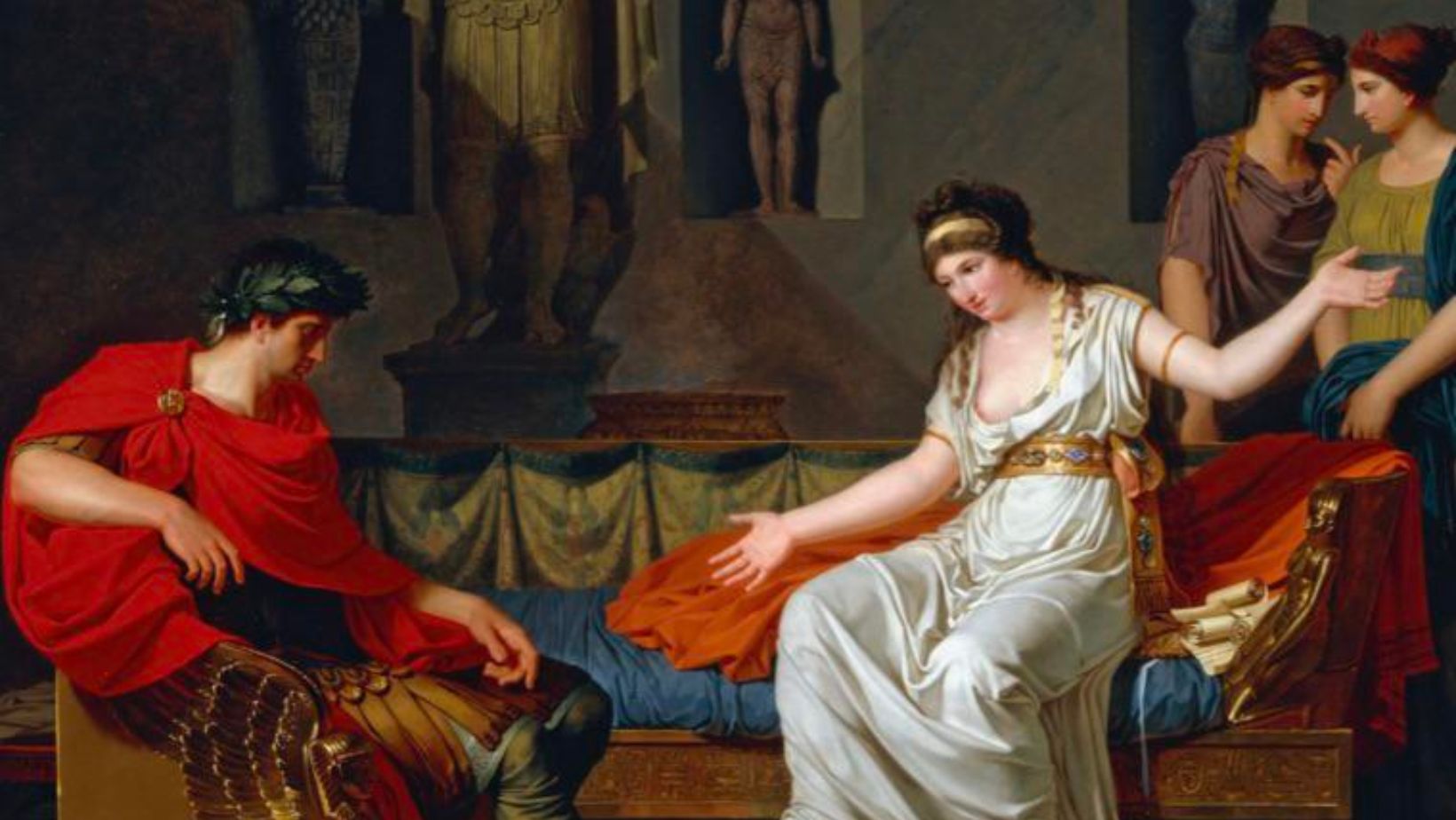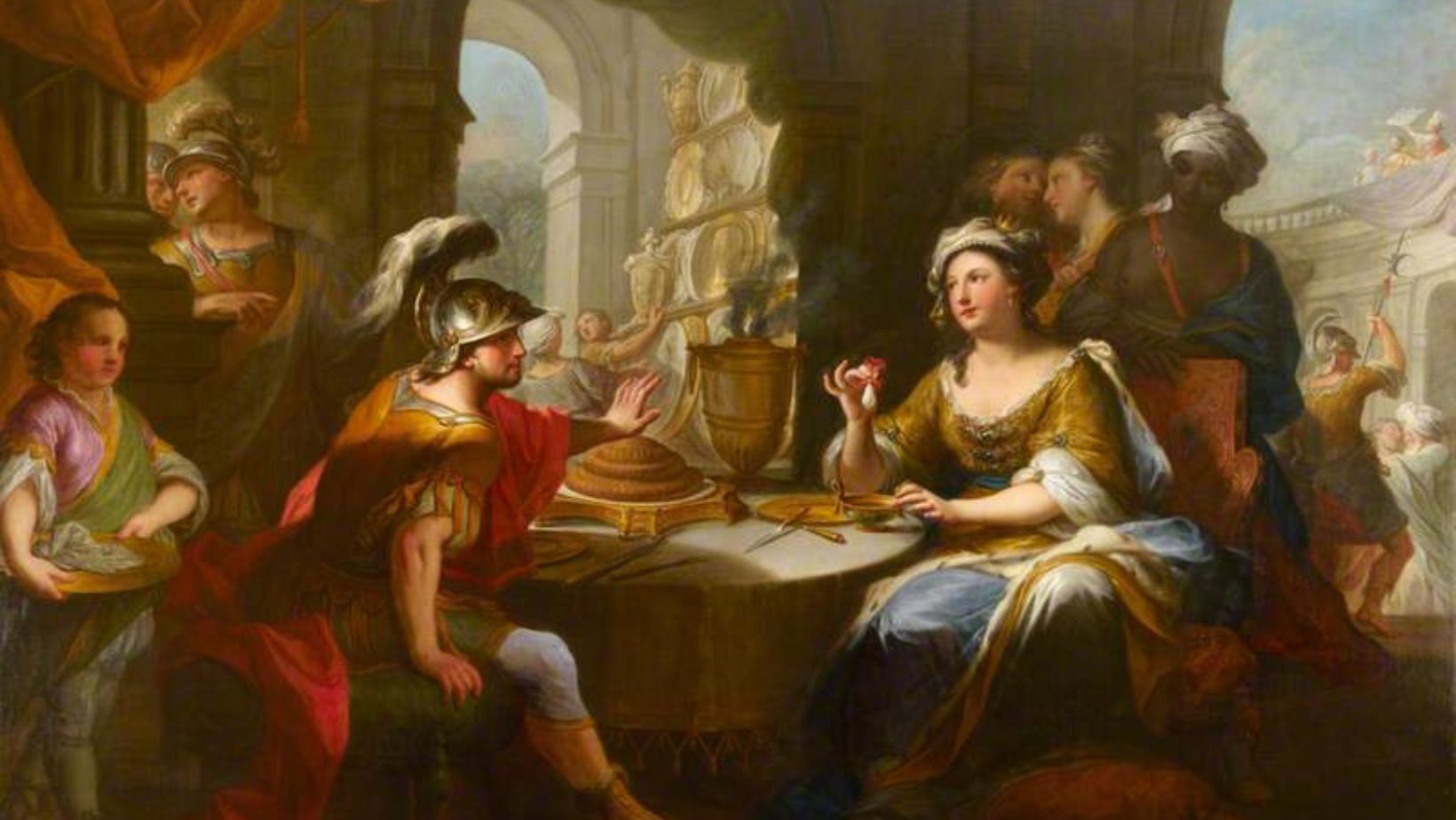When we talk about epic tales from the past, few stories capture our imagination like that of Cleopatra and Julius Caesar. Don’t think of this as just another page out of a history book; imagine it more like a tale filled with clever political moves, unexpected turns, and the kind of love story that becomes legendary. Born out of turbulent times in 48 BC when Egypt was on the brink of collapse under its own dynasty’s weight, their alliance wasn’t merely by chance but a calculated move to secure power.
Their tale weaves together not just shared dreams but also the deep connections they’ve built, despite everything stacked against them. How did this powerful woman manage to turn her country’s fate around? And what role did the famed Roman general play in this turnaround? Strap in as we journey back to ancient times to unravel one of history’s most fascinating partnerships.
Table of Contents:
- The Political Alliance Between Cleopatra and Julius Caesar
- The Siege of Alexandria and Caesar’s Triumph
- Cleopatra’s Visit to Rome and Its Aftermath
- The Legacy of Cleopatra and Caesar’s Relationship
- Conclusion
The Political Alliance Between Cleopatra and Julius Caesar: Cleopatra and Julius Caesar

Cleopatra VII, the last pharaoh of Ancient Egypt, is often remembered for her political prowess and her romantic entanglements with two of the most influential Roman leaders of her time — Julius Caesar and Mark Antony.
This article seeks to delve into the intricacies of Cleopatra’s relationships with these two men, exploring the political alliances that shaped the fate of nations and the personal dynamics that fueled historical narratives.
Cleopatra’s Rise to Power: Cleopatra and Julius Caesar
Cleopatra VII Philopator was born in 69 BC in Alexandria, Egypt. She was a member of the Ptolemaic dynasty, a family of Macedonian Greek origin that ruled Egypt after Alexander the Great’s death.
When her father, Ptolemy XII, died in 51 BC, Cleopatra and her younger brother, Ptolemy XIII, inherited the throne. As was customary, they married and ruled Egypt as co-rulers.
Caesar’s Arrival in Alexandria
In 48 BC, Julius Caesar arrived in Egypt in a civil war between Cleopatra and her brother Ptolemy XIII. Caesar sided with Cleopatra, and the two became allies and lovers.
Cleopatra needed Caesar’s support to regain her throne, while Caesar saw Cleopatra as a useful ally in his plans to control the eastern Mediterranean.
The Birth of Caesarion
In 47 BC, Cleopatra gave birth to a son, Ptolemy Caesar, nicknamed Caesarion, which means “little Caesar.” It was widely believed that Julius Caesar was the father.
The birth of Caesarion strengthened the political alliance between Cleopatra and Caesar. Cleopatra now had an heir claiming power in Egypt and Rome.
The Siege of Alexandria and Caesar’s Triumph: Cleopatra and Julius Caesar
Ptolemy XIII’s Power Play
In 47 BC, Ptolemy XIII’s forces trapped and besieged Caesar and Cleopatra in Alexandria. Caesar was outnumbered, but he eventually defeated Ptolemy’s forces.
Ptolemy XIII drowned in the Nile while trying to flee. With Ptolemy XIII dead, Caesar restored Cleopatra to the throne, now as the sole ruler of Egypt.
The Battle of the Nile: Cleopatra and Julius Caesar
The Battle of the Nile was a crucial naval engagement during Caesar’s Civil War in 47 BC. Caesar’s outnumbered forces, trapped in Alexandria, defeated the powerful Egyptian fleet under Ptolemy XIII.
This victory helped turn the tide in Caesar’s favor and led to the defeat of Ptolemy XIII’s forces.
Caesar Installs Cleopatra as Sole Ruler
After his victory in Alexandria, Julius Caesar installed Cleopatra as the sole ruler of Egypt, along with her younger brother Ptolemy XIV as co-ruler. However, Cleopatra was the one in control.
Caesar’s actions made Cleopatra dependent on Roman power for her position, setting the stage for future Roman involvement in Egypt.
Cleopatra’s Visit to Rome and Its Aftermath:Cleopatra and Julius Caesar
Cleopatra’s Exotic Presence in Rome
In 46 BC, Cleopatra visited Rome with her son Caesarion. Her exotic presence caused a sensation in the city.
She lived in Caesar’s villa and was present at the dedication of a golden statue of herself in the temple of Venus Genetrix, Caesar’s patroness. This visit demonstrated the close political and personal relationship between Cleopatra and Caesar.
The Assassination of Julius Caesar
On the Ides of March (March 15) in 44 BC, Julius Caesar was assassinated by a group of senators who feared he was becoming too powerful.
Cleopatra was in Rome at the time and she quickly fled back to Egypt, realizing that her position was now precarious without Caesar’s support.
Cleopatra’s Flight Back to Egypt: Cleopatra and Julius Caesar
After Caesar’s assassination, Cleopatra returned to Egypt. She had to navigate a complex political situation without her powerful Roman patron.
She would eventually form alliances with Mark Antony to secure her position and that of her son Caesarion. However, her ties to Caesar would continue to shape her fate and that of Egypt.
The Legacy of Cleopatra and Caesar’s Relationship: Cleopatra and Julius Caesar

The Children of Cleopatra and Caesar
Cleopatra and Julius Caesar had one son together, Ptolemy Caesar, known as Caesarion. After Caesar’s death, Cleopatra promoted Caesarion as Caesar’s heir, although Caesar had named his great-nephew Octavian as his adopted son and heir in his will.
Caesarion’s fate was tied to the power struggles that followed Caesar’s assassination.
The End of the Ptolemaic Dynasty: Cleopatra and Julius Caesar
The relationship between Cleopatra and Julius Caesar set in motion a chain of events that would lead to the end of the Ptolemaic dynasty and the fall of Egypt to Roman rule.
After Caesar’s death, Cleopatra allied with Mark Antony, eventually bringing her into conflict with Octavian (later Augustus). After Antony and Cleopatra’s forces were defeated at the Battle of Actium in 31 BC, Octavian invaded Egypt. Cleopatra committed suicide in 30 BC, and Egypt became a province of the Roman Empire.
The Enduring Fascination with Cleopatra and Caesar
The story of Cleopatra and Julius Caesar has fascinated people for over 2,000 years. It is a tale of power, romance, and tragedy that has inspired countless works of art, literature, and film.
From Shakespeare’s play “Antony and Cleopatra” to the 1963 film “Cleopatra” starring Elizabeth Taylor, the relationship between these two iconic figures continues to capture the imagination. Their story is one of the most famous examples of the complex interplay of love and politics in history.
Key Takeaway: Cleopatra and Julius Caesar
Cleopatra and Julius Caesar’s alliance was more than a love story; it was a strategic political move that shaped history. Their partnership brought Cleopatra back to power, tied Egypt closer to Rome, and set the stage for future conflicts.
Conclusion: Cleopatra and Julius Caesar
So here we are at the end – having traced through sandstorms time whisked away long ago – arriving at insights into how two colossal figures maneuvered through politics’ treacherous tides. The saga between Cleopatra and Julius Caesar, beyond any shadowing myth or silver screen glamorization, brings forth leadership lessons meshed with heart-led desires.
This expedition across historical landscapes shows us more than strategic alliances for sheer survival; it reveals nuanced layers within these icons who still echo today—driving home that beneath crowns or titles lie hearts beating for more than mere dominion. So while AI might spin facts into readable yarns day in out – remember it takes curious minds to delve deeper behind storied veils pulled over ages gone by.

